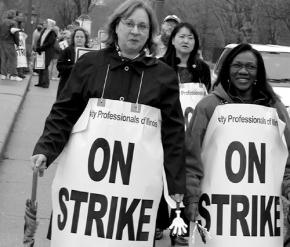Defending Loretta Capeheart
, an associate professor of Communication Studies at the University of Texas, gives an update on the fight for justice for Loretta Capeheart, a professor at Northeastern Illinois University in Chicago who is under fire from the administration for speaking out in support of left-wing causes and ideas.
Dear supporters and signers (and potential signers and supporters) of the Justice for Loretta Capeheart petition:
Thank you all for your support and your continued commitment to free speech and academic freedom. As of today, we have 700 signatures, including those of prominent scholars Noam Chomsky and Howard Zinn. Please join them, if you have not, in signing the petition to support Loretta. Also, please forward this call far and wide as you see fit.
There is an emerging front in the struggle for academic freedom. Some university leaders are attacking outspoken faculty on the grounds that university employees have no free speech rights when it comes to criticizing their own institutions.
This attack epitomizes Northeastern Illinois University's (NEIU) harassment of justice studies professor Loretta Capeheart, who has been targeted by her administration for her outspokenness for workers' rights in a 2004 faculty strike, against the Iraq war, in defense of student protesters, and for increased representation of minority scholars at NEIU.

In retaliation, she was denied merited awards and an appointment to chair of her department--a position to which she was elected. NEIU Vice President Melvin Terrell publicly defamed Capeheart, accusing her without grounds of stalking a student.
Capeheart is suing Terrell for defamation, alongside NEIU's president and provost for retaliation and violation of her constitutional right to free speech. Incredibly, the administrators' response argues that Capeheart, as a state employee, may not sue the university or its officials, contravene their positions, question their conduct, or speak as a faculty member on matters of public concern. Their motion to dismiss the case states that "clothed in her authority as a faculty member," Capeheart criticized university policy, "even going so far as to disagree with the stated positions of the Provost." "It is very middle ages," Capehart said, "like the lord vs. the serf."
Unfortunately, the administration has frightening legal precedent, according to the American Association of University Professors. The Supreme Court's 2006 decision in Garcetti v. Ceballos held that state employees are not afforded First Amendment protection if they are speaking on subjects relevant to their professional duties; When University of California-Irvine professor Juan Hong angered university administrators by opposing the replacement of tenure-track faculty by term lecturers, he was denied a merit salary increase. The Court ruled against Hong, citing Garcetti.
However, there is some good news to report on Loretta's case! On March 2, 2009, Judge Blanche Manning, U.S. District Court Judge, Northern Illinois District, agreed to hear Loretta's case despite the university's arguments that it was "futile" for her to claim any right to free speech. As Judge Manning wrote:
The defendants oppose the amendment on the basis that it would be futile. Specifically, they contend that the First Amendment protects only speech by public employees that addresses matters of public concern as opposed to matters involving their official duties. See Garcetti v. Ceballos, 547 U.S. 410, 417 (2006) ("when public employees make statements pursuant to their official duties, the employees are not speaking as citizens for First Amendment purposes, and the Constitution does not insulate their communications from employer discipline.")
The defendants contend that the speech at issue was not protected by the First Amendment because (i) it addressed university policy, (ii) occurred at university-sponsored events which Capeheart attended as a university employee, and (iii) concerned her official duties. However, as Capeheart argues, the speech also addressed matters of public concern such as discrimination and the ability of students to express antiwar views. At this juncture, without the benefit of a full record including details of Capeheart's speech and the nature of the events she attended, it would be premature to determine whether her speech was protected by the First Amendment. Accordingly, futility is not a basis for denying Capeheart's motion for leave to amend.
There is still much to do to guarantee justice for Loretta and to defend our rights to free speech and academic freedom. We are asking that you continue to forward the link to the petition to others concerned with academic freedom and urge them to sign on to the petition. A press conference will be called for the petition delivery to NEIU President Sharon Hahs in April. An announcement will be forthcoming.
If you have not already done so, please sign the "Justice for Loretta Capeheart" petition and encourage others to do so.


